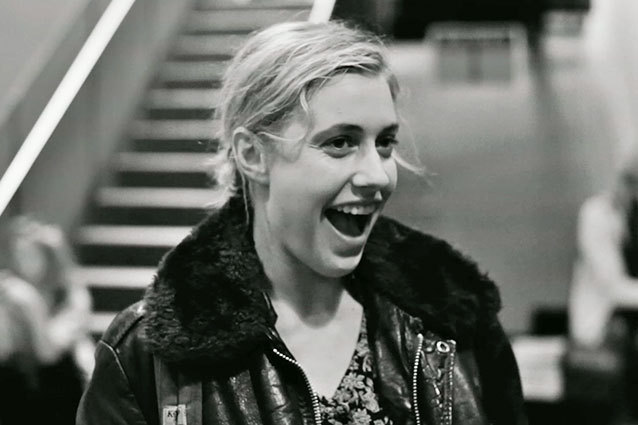Directed by Noah Baumbach
Written by Noah Baumbach and Greta Gerwig
USA, 2013
By now, young people scratching and clawing their way towards adulthood is a quintessential, clichéd story. The wide-eyed dreamer trying to make it in the big city is one of the hoariest tricks in the book, but Frances Ha is a welcome new variation on this theme, a striking and beautiful ode to youth and its many flaws. Headlined by Great Gerwig, Frances Ha is nothing short of a triumph, an endearing, unforced, and honest story of failures and frustrations.
Gerwig plays Frances, an apprentice in a New York ballet company who hopes to break into the main group of dancers soon. Her life begins to spiral out of control when her best friend Sophie (Mickey Sumner) moves out of their small apartment and quickly becomes serious with a boyfriend and moves out of the country for work reasons. Sophie’s affairs are in order, but Frances wanders through New York City and the world, attempting to squeeze some semblance of meaning from her peers and her work. Frances may meander, but Frances Ha is hyper-focused. Frances gets in her own way all the time; yet, it is strangely compelling and delightful to behold.
Credit where it’s due to Gerwig, who co-wrote the film with its director, Noah Baumbach. She delivers a performance that is as passionate, as awkward, and as exciting as that of Diane Keaton in Annie Hall. It’s hard not to consider Frances Ha alongside many of Woody Allen’s best, earlier blends of comedy and drama, such as Annie Hall and Manhattan, the latter of which was, like this film, shot in black-and-white. What made those films so special is not just Allen’s unique, fast-paced, singular style of wit, but that he captured a very specific modern mentality. Frances Ha is less about the kind of adults who walk around art galleries and independent movie theaters as if they own the place than about those people 10 years before they’re able to traverse the world of grown-ups confidently.
Though every twentysomething character in Frances Ha has created a level of bluster to fool themselves as much as their friends have that their lives are made, Frances is by far the one who denies her flaws more than anyone else. She is at times flighty, overly confident, unlikable, painfully deluded, and intelligent. In short, Frances is human; one imagines that she may be very similar to Gerwig herself, but who cares? All that matters in this case is what’s on the screen, and what’s on the screen is a tour de force performance, coupled with the sheer joy of discovery at who should surely be one of the next great actresses. Gerwig, in front of the camera for nearly every second of this film, has to run a gamut of emotions from moment to moment. Frances waves goodbye to her parents after a fun if too-quick holiday trip, and in her face, we see elation, sadness, anger, and more flash by within seconds. Or she reconnects with Sophie as her best friend inches closer to domesticity, and her eyes fill with envy. Frances is, perhaps, easy to dislike but maybe that’s because she’s immensely easy to relate to.
The rest of the cast, outside of Sumner, is more a group of background players in Frances’ daily foibles; of them, only Adam Driver (partly for being the most recognizable in the ensemble) and Michael Zegen (as one of Frances’ many roommates throughout the 85-minute story) stand out. Gerwig and Sumner have excellent chemistry as friends so close that they sleep in the same bed, so intertwined in life—Frances identifies herself and Sophie as being the same people with different hair—that their fights have the sting of a longtime married couple’s bickering. But Gerwig is the star here. And Noah Baumbach has created here a truly exceptional portrait of realistic young life in the 21st century, stripping down the artifice present in films such as Margot at the Wedding and Greenberg.
Frances Ha is a film brimming with vitality, wit, and warmth, the ideal version of how Frances wishes to be perceived by those around her. She waltzes through her life—in one memorable montage, she literally dances down the streets of New York City, to a soundtrack in her head—no matter what is thrown at her. The film, like the character, is prickly and irritating, humane and fully realized. One moment, you might find her adorable; the next, you might want to run far away from her. In spite of her flaws, Frances is a winning young woman; even if she doesn’t know what she wants from life, it’s hard not to root for her to get even a meager victory. She deserves, if nothing else, the smallest win. Frances Ha, on the other hand, is a massive victory of performance and presentation.
— Josh Spiegel




